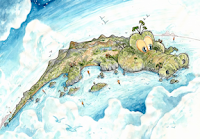LAST STOP!
Timor
Legends and poems from the land of the sleeping crocodile
Cliff Morris
H.C. Morris, 1984.
A small, but super fascinating volume. It is a bilingual edition (Tetum-English), containing mirror translations, so it was only a hundred-odd pages to read. The tales have all been collected by people who were born and raised in East Timor and then moved somewhere else (Australia, Portugal, etc.). Each story came with a short introduction about the teller. The English translation was a bit odd at times, but it was still an enjoyable read.
Timor
Legends and poems from the land of the sleeping crocodile
Cliff Morris
H.C. Morris, 1984.
A small, but super fascinating volume. It is a bilingual edition (Tetum-English), containing mirror translations, so it was only a hundred-odd pages to read. The tales have all been collected by people who were born and raised in East Timor and then moved somewhere else (Australia, Portugal, etc.). Each story came with a short introduction about the teller. The English translation was a bit odd at times, but it was still an enjoyable read.
The book starts with short poems that seem like proverbs, and each of them is explained (which is lucky, because I would not have drawn "don't sweat the small things" from "pigeon hiccups in the jungle, fruit remains").
By the way, in case you were wondering, this is where East Timor is located:
According to the origin myth of the island, Timor was originally a young crocodile, saved by a human boy from death, who turned into an island as a thank you to people. Crocodiles appeared as helpers or heroes in multiple stories, and only attacked people who deserved it.
The tale of Bui Iku was haunting: a girl was locked in a house built in a mango tree by her six brothers, and only the youngest cared for her. When she got pregnant from a divine prince her five brothers killed her, but her lover brought her back. Their child was born among the stars, and returned to earth to punish the evil brothers, and reward the kind one.
There were two legends about how Christianity arrived to Timor, both from the perspective of the native people. They claim the "holy man" of the white people threatened to drag the whole island to Portugal if they did not convert; he put an anchor into the seashore and pretended to pull it with his ship. In that moment, the earth shook, and everyone was scared into converting... While the story was told as a positive thing, it does carry some of the pain over colonization. There was a fascinating twist on the "stolen bride" tale type: a boy spied on the seven daughters of the Sun, and tried to kidnap the youngest to make her his wife (this is a common folktale motif). She, however, fought back: she flew up into the sky with her attacker, burned him, then threw him down.
Connections
The most interesting connection was the story of Joao the Gambler (John in English). The hero was taken to a castle by a giant bird he had to feed on the way (he used his own flesh for the last few bites). It was Master Maid story where the giant's daughter helped the hero fulfill tasks, and turn into various things during a magic flight scene. It was a common tale type, but with nice local colors: one of the "impossible tasks" was to find mangos out of season.
The tale of the sacred machete also reminded me of European tale types; here the hero was helped by three giants, and revived by them when his enemies killed him. There was also a Cinderella story (Daughter of the sun), and a magic tablecloth type tale (Bui Kiak and Mau Kiak).
It is not very surprising to see European connection, given the colonial history of the island. However, all the familiar stories merged nicely with the local culture, flora and fauna. In addition, burning the skin of animal husbands (snakes and eels) was an actual solution in these tales, while in European stories it is usually presented as a mistake.
There was a version of the magic fishhook story that I knew from Japan: in the story of the sick princess a man lost a hook borrowed from his brother, and had to descend into the ocean to find it. He managed to locate the hook in the mouth of the Sea King's daughter.
Where to next?
We are done! I'll take a short break, write a summary of this adventure, and start a new challenge...





Thank you for locating Timor on a map for us, I've heard of it, but would have looked somewhere completely different! I like the proverb about the pigeon hiccuping, even if I can't make sense of it! Like one of those unsolvable riddles.
ReplyDelete